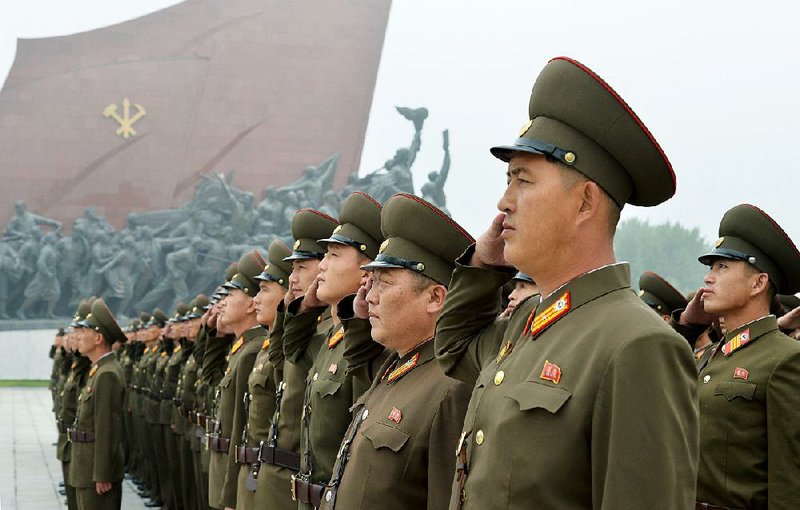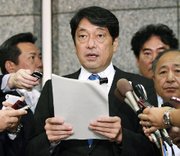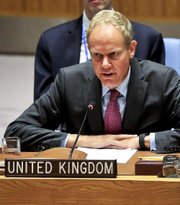UNITED NATIONS -- North Korea illegally exported coal, iron and other commodities worth at least $270 million to China and other countries including India, Malaysia and Sri Lanka in the six-month period ending in early August in violation of U.N. sanctions, U.N. experts said in a report released Saturday.
The 111-page report was written before North Korea's sixth and most powerful nuclear test last Sunday and its latest launch of a powerful new intermediate-range ballistic missile over Japan.
The U.N. experts said implementation of existing sanctions "lags far behind what is necessary to achieve the core goal of denuclearization" of the Korean Peninsula.
The report was made public two days before the United States has called for a vote on a new sanctions resolution. The original U.S. draft would impose the toughest-ever sanctions on North Korea, including banning all oil and natural gas exports to the country and freezing all foreign financial assets of the government and its leader Kim Jong Un.
President Donald Trump's administration adopted a totally new approach with the resolution, circulating an American draft Tuesday and setting a vote six days later. With previous sanctions resolutions, the U.S. spent weeks and sometimes months negotiating the text with China and then presenting a resolution to the rest of the Security Council for a vote.
Several diplomats said the U.S. demand for a speedy council vote was aimed at putting maximum pressure on China and reflected Washington's escalating concern.
Japanese Defense Minister Itsunori Onodera said he hoped for a firm U.N. resolution, adding that stronger economic penalties might lead to a change in North Korea's behavior. "Oil sanctions are the most effective sanctions, so I'd like to strongly ask for this," he said on Saturday on Nippon Television.
Britain's U.N. Ambassador Matthew Rycroft, who backs "robust" new sanctions, said Thursday that the U.S. proposals to ban all oil imports and textile exports and prohibit North Koreans from working overseas -- which help fund and fuel the country's nuclear and missile programs -- are "a proportionate response" to its "illegal and reckless behavior."
Rycroft stressed that "maximum possible pressure" must be exerted on North Korea to change course and give diplomacy a chance to end the crisis.
The U.S. draft also identified nine ships that have carried out activities prohibited by previous U.N. resolutions and would authorize any U.N. member state to stop these vessels on the high seas without their consent and use "all necessary measures" -- which in U.N. language includes force -- to carry out an inspection and direct the vessel to a port.
Professor Joseph DeThomas of Pennsylvania State University, a former U.S. ambassador and State Department official who dealt with North Korea, said the U.S. demand for quick council action is "an indicator of how the administration thinks time has run out."
"My sense is they believe that they don't have time for a delicate diplomatic dance," he said in a phone interview Friday. "The other possibility ... is they want to see the color of China's money. They're putting down the marker here and saying 'OK, are you prepared to do what is necessary to put pressure on North Korea at a moment when we're simply out of time?'"
The diplomats, speaking on condition of anonymity because discussions on the resolution have been private, said all 15 Security Council members discussed the draft Friday, and both China and Russia appeared willing to negotiate.
Russia has said sanctions aren't working and President Vladimir Putin expressed concern that a total oil cutoff could hurt the North Korean people. Beijing and Moscow have called for a resolution that focuses on a political solution and have proposed a freeze-for-freeze that would halt North Korean nuclear and missile tests in exchange for the U.S. and South Korea halting their joint military exercises -- an initiative rejected by the Trump administration.
There was no word on the outcome of negotiations, and whether any changes sought by the Russians and Chinese were acceptable to the United States.
A brief statement from the U.S. Mission to the United Nations late Friday said: "This evening, the United States informed the U.N. Security Council that it intends to call a meeting to vote on a draft resolution to establish additional sanctions on North Korea on Monday, September 11."
U.N. Secretary-General Antonio Guterres, who called the nuclear risk in North Korea the most dangerous crisis in the world today, told reporters Tuesday that "the unity of the Security Council is absolutely crucial." He explained that only a united council can provide the pressure needed to enable successful negotiations to take place to denuclearize the Korean Peninsula.
DeThomas agreed that it was unwise to break the unity of the Security Council, but he said the U.S. administration is unlikely to accept "a very watered down approach."
He said putting the Chinese "on the other team" won't benefit the United States in the long-term.
He explained that this would force the U.S., and possibly Japan and South Korea, to try to do things unilaterally to increase pressure on North Korea. But he said trying to stop goods and material flowing from China to North Korea without U.N. backing would substitute a U.S.-China confrontation for the current nuclear weapons crisis with the Democratic People's Republic of Korea, the country's official name.
As for the North Koreans, their official news agency on Friday said the country's "nuclear weaponization ... has reached its final phase."
The Korean Central News Agency report sharply criticized U.S. Ambassador Nikki Haley for playing "the flagship role" in the Trump administration's "hideous sanctions and pressure racket against the [Democratic People's Republic of Korea]."
The agency called Haley "a political prostitute" and dismissed as "rubbish" her comments at an emergency Security Council meeting Monday after the latest nuclear test that the Democratic People's Republic of Korea is "begging for a war." The agency accused the U.S. of being the "chieftain of aggression and war and wrecker of peace."
The U.S. Mission to the United Nations said it had no comment on the agency's report, which concluded by saying: "The U.S. administration will have to pay a dear price for her tongue-lashing."
On Thursday, Trump said it wasn't inevitable that the U.S. would end up in a war with North Korea, but that military action remained an option.
"I would prefer not going the route of the military, but it is something certainly that could happen," Trump said in a news conference at the White House.
He declined to say whether he'd accept a nuclear-armed North Korea that can be successfully deterred from using such weapons. A senior administration official later told reporters the United States won't let North Korea extort or threaten the world with its nuclear program, and that the administration isn't sure the country could be deterred.
The Trump administration also kept up efforts to persuade other governments to scale back diplomatic and economic ties with North Korea. Secretary of State Rex Tillerson raised the issue of North Korean "guest workers" in Kuwait during a meeting with the Middle Eastern country's foreign minister in Washington on Friday.
Mexico has given North Korea's ambassador 72 hours to leave the country, though Foreign Minister Luis Videgaray later said it had not broken off diplomatic ties. Philippine Foreign Secretary Alan Peter Cayetano told reporters in Manila on Friday his country was ready to cut trade ties to North Korea.
South Korea's government earlier said North Korea could potentially mark the 69th founding anniversary Saturday with its third test of a developmental intercontinental ballistic missile.
But no weapons test was detected from North Korea as of Saturday afternoon, as people in capital Pyongyang went through customary practices of showing loyalty to late leaders Kim Il Sung and Kim Jong Il, the father of third-generation leader Kim Jong Un.
This year's anniversary came just after North Korea conducted its sixth and most powerful nuclear test to date last weekend, which it claimed as a detonation of a thermonuclear weapon built for its ICBMs. The North flight-tested its developmental Hwasong-14 ICBMs twice in July and analysis of flight data suggested that the missiles could reach deep into the U.S. mainland when perfected.
North Korea often marks big anniversaries every five years with giant public celebrations. Last year it held a nuclear test on this September anniversary.
Information for this article was contributed by Edith M. Lederer of The Associted Press; and Peter Pae, Linly Lin, Kanga Kong, Kambiz Foroohar, Nick Wadhams, Kim Chipman, Ben Livesey, Keiko Ujikane, Jennifer Epstein, Sohee Kim, Margaret Talev, David Tweed, and Helen Sun of Bloomberg News.
A Section on 09/10/2017



